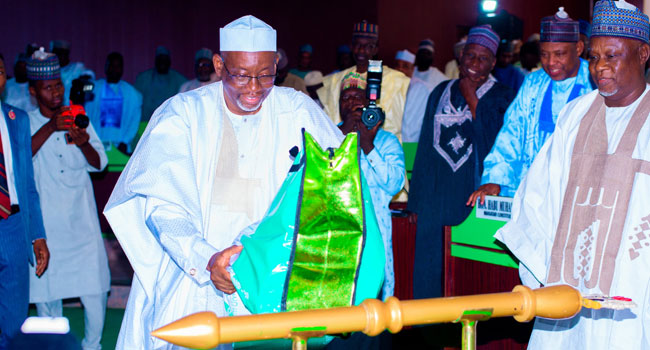Jigawa State Governor, Umar Namadi, has presented a budget proposal of ₦698.3 billion for the 2025 fiscal year, with education receiving the highest sectoral allocation of N184 billion.
In his presentation to the State House of Assembly, Governor Namadi described the budget, tagged the “Budget of Innovation & Transformation for Greater Jigawa,” as a strategic plan to address the state’s developmental challenges while positioning it for sustainable growth.
“Education is the foundation of any progressive society,” the governor said. “With ₦184 billion, representing 26.4% of the total budget, we aim to strengthen our basic and tertiary education systems. This allocation will fund the construction and rehabilitation of schools, improve teacher recruitment, and expand access to digital learning.”
He further highlighted flagship initiatives such as the establishment of Model Tsangaya Schools, the creation of a Tsangaya Education Agency, and the upgrade of eight schools to Centers of Excellence.
Healthcare, the second-highest allocation, received ₦150 billion, reflecting the administration’s commitment to enhancing access to quality health services.
“Health is wealth, and our people deserve the best,” Governor Namadi stated. “This allocation will enable us to expand our free maternal and child healthcare services, recruit more health professionals, and upgrade critical medical facilities like the Jigawa State Specialist Hospital.”
The agriculture sector, which remains the backbone of the state’s economy, was allocated ₦120 billion.
Governor Namadi said this funding would support irrigation projects, mechanized farming, and livestock development. Mechanised.
“Our farmers are the heartbeat of Jigawa’s economy. With this allocation, we will create Agro-Processing Centers and invest in initiatives that increase productivity and improve livelihoods,” he explained.
The budget also allocates ₦100 billion to infrastructure development, focusing on roads, housing, and renewable energy projects. Major initiatives include the dualization of the Hadejia-Gumel Road and the Jigawa Solar Energy Initiative, which aims to improve electricity access for rural communities.
“Our infrastructure investments are not just about roads and buildings; they are about connecting people to opportunities,” the governor noted.
To empower vulnerable groups and promote inclusive growth, the government has set aside ₦70 billion for social development programs, including youth and women empowerment schemes and conditional cash transfers. An additional ₦45.3 billion has been dedicated to economic diversification projects to reduce the state’s dependence on federal allocations.
Governor Namadi concluded his address by reaffirming his administration’s commitment to the people of Jigawa.
“This budget is a promise to the people—a promise to deliver innovation, transformation, and progress. Together, we will build a Jigawa that leaves no one behind.”
The Speaker of the State House of Assembly commended the governor’s focus on critical sectors, assuring the people of a thorough review process. The 2025 budget, once approved, is expected to set Jigawa State on a path of sustained development and prosperity.


